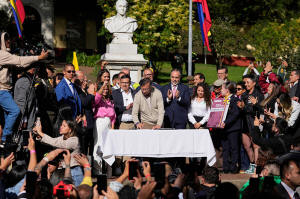Colombia's president signs a labor overhaul into law after 2 failed
attempts
[June 26, 2025]
BOGOTA, Colombia (AP) — Colombian President Gustavo Petro signed into
law on Wednesday a controversial labor overhaul with the potential to
profoundly shift the balance of power from employers to workers, a key
victory for the left-wing leader even as Congress compelled him to scale
back his more radical ambitions.
The enactment of the law marks a milestone for a president who has
struggled to deliver on his promises to reduce inequality in one of the
region's most unequal nations. But it's faced opposition from business
leaders and Colombian government bonds have suffered as markets worry
about the fiscal and economic effects.
The law increases overtime pay for salaried workers and limits the use
of short-term contract workers, while requiring companies to provide
medical coverage and social security for gig workers like food delivery
drivers. It also promises student interns proper contracts and benefits
like vacation time and severance pay.
Many of Petro’s efforts to vastly expand social programs have stalled in
Congress, with lawmakers shooting down this labor law twice. Lawmakers
let the legislation squeak by last week after Petro’s moved to call a
public referendum.
Petro signs the law at the home of Simón Bolívar
Petro signed the legislation at the historic home of 19th-century war
hero Simón Bolívar, who led South America's fight against imperial
Spain.
He posted on social media platform X: “I sign the labor reform into law
before Bolívar and the working people.”

“We must elect a government that will uphold this law and enforce it,”
Petro said, alluding to the 2026 presidential elections.
Opposition says the law will hurt employment
The reform was cheered by trade unions and Petro’s political allies
Wednesday.
But his push to strengthen worker protections has proved controversial,
as the expensive benefits are expected to hike up costs for business
owners. Petro’s government has promised to push through a new bill to
help small businesses, though the details remain unclear.
[to top of second column] |

Colombia's President Gustavo Petro signs a labor reform bill into
law in Bogota, Colombia, Wednesday, June 25, 2025. (AP
Photo/Fernando Vergara)
 Opposition lawmakers have painted a
nightmare scenario of mass layoffs that will push more workers into
Colombia’s already vast informal economy.
Many say that the mandated reductions in working hours, increases in
overtime pay for Sunday and holiday shifts will especially squeeze
small and medium-sized businesses.
Already, his government’s increased spending and reduced tax income
have challenged fiscal stability.
Critics also say that the changes won’t help informal workers
without contracts, who represent over half of Colombia’s total labor
force, according to the latest figures. The legislation guarantees
health and pension benefits for only some gig workers, such as
app-based delivery workers.
Then there’s the question of compliance. “I want to tell those
employers who say they won’t implement the labor reform that they’re
not intelligent,” Petro said on Wednesday.
Petro had to scale back the law to get it through
Even as he hailed the law, it fell short of Petro's ambitions. He
was forced to compromise on some key provisions to push it through a
hostile Congress.
Provisions stripped from the final version included extended
paternity leave, paid leave for women with debilitating menstrual
pain and some collective bargaining rights for unions.
The signing of the law comes at a tumultuous time for the third
largest nation in Latin America, with a wave of bombing attacks
shaking the northeast and an assassination attempt on conservative
presidential hopeful and senator Miguel Uribe stunning the country.
Uribe remains in intensive care.
All contents © copyright 2025 Associated Press. All rights reserved |